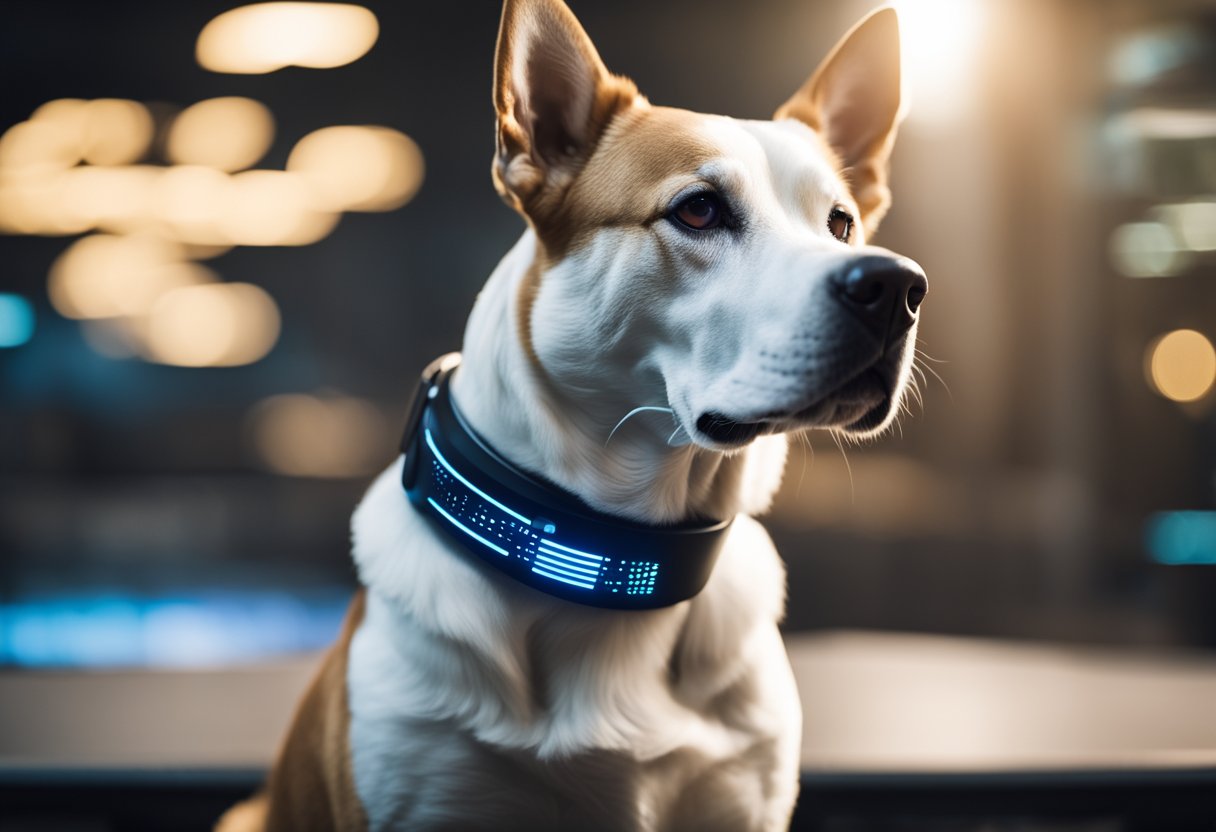In the realm of pet health and wellness, the dispatch of AI technology represents a ground-breaking shift. We now harness the power of artificial intelligence to elevate the standard of care our beloved companions receive. By providing pet owners and veterinarians with advanced tools for diagnostics, tailored nutrition plans, and behavior analysis, AI is taking pet care into an era of unprecedented precision and personalization.
Imagine a world where insights into your pet’s well-being are at your fingertips. Our furry friends can’t verbalize their needs, but AI-driven platforms are changing the game, offering real-time monitoring and actionable health data. These digital allies lead to proactive care, potentially extending the healthy years of pets’ lives and strengthening the bonds we share with them.
Key Takeaways
- AI technology is revolutionizing pet health care with personalized plans and diagnostics.
- Real-time monitoring of pet health can lead to proactive wellness strategies.
- Technological advancements in AI contribute to stronger human-pet relationships.
Fundamentals of AI in Pet Health
As we embrace the digital age, it’s exciting to see how artificial intelligence (AI) is ushering in a new era of pet healthcare. We’re at the forefront of integrating advanced AI technologies in veterinary medicine, enhancing our pets’ well-being in ways we could only imagine a few years ago.
AI Technologies in Veterinary Medicine
AI in veterinary medicine primarily revolves around diagnostic tools, predictive analytics, and personalized treatment plans. Sophisticated algorithms analyze vast amounts of data, from medical records to genetic information, to assist in accurate diagnosis and prognostics. For example, imagine computer vision technologies that can scan and interpret X-rays or MRIs faster than the human eye, pinpointing issues with great precision.
- Diagnostic Assistance: AI systems are trained to recognize signs of disease in various medical images.
- Predictive Health Monitoring: Wearables and IoT devices track vital signs, predicting potential health issues before they become serious.
Not only does this technology speed up the diagnostic process, but it also supports veterinarians with more reliable data to make informed decisions.
Benefits of AI for Pets’ Well-Being
AI’s impact on pets’ health is profound and multi-faceted. With AI-driven insights, we can tailor prevention and treatment plans to each individual pet’s needs, leading to:
- Improved disease management: AI algorithms detect patterns that might indicate the early onset of disease.
- Enhanced quality of life: Customized care plans contribute to happier, healthier lives for our furry friends.
Taking proactive steps toward health management means fewer trips to the vet, less stress for pets, and peace of mind for pet owners. The use of AI streamlines the healthcare process, making it more efficient and effective – ultimately, it’s our pets who reap the benefits.
AI-Powered Nutrition and Diet Planning

We all want the best for our furry friends, and that starts with what they eat. Imagine a world where your pet’s nutrition is tailored precisely to their unique needs—a world we’re stepping into with AI-powered nutrition and diet planning.
Personalized Pet Diet Algorithms
AI is transforming how we manage our pets’ diets by using sophisticated algorithms to create personalized feeding programs. With these systems, we input details about our pets’ breed, age, activity level, health issues, and even flavor preferences. The AI then processes this data to design a diet plan that is not just a one-size-fits-all solution but one that adapts to our individual pets’ evolving needs.
Monitoring and Adjusting Pet Diets with AI
Beyond just creating diet plans, AI is capable of monitoring our pets’ health and dietary patterns over time. Sensors in smart bowls track consumption, while activity monitors gauge energy expenditure. Should our pets’ needs change—perhaps due to weight gain, allergies, or health concerns—AI systems can suggest adjustments, ensuring optimal nutrition through every stage of their lives.
Veterinary Diagnostics Enhancement

Advancements in technology have brought us to a pivotal moment in veterinary medicine, where AI’s integration is revolutionizing how we diagnose and treat our pets. Our ability to harness AI for imaging and predictive analytics is enhancing the accuracy and speed of veterinary diagnostics, leading to better outcomes for pet health.
AI in Imaging and Diagnostics
Artificial Intelligence has significantly improved the capabilities of veterinary imaging tools. Using sophisticated algorithms, AI can analyze X-rays, MRIs, and CT scans rapidly, often identifying nuances that might escape even the most trained human eyes. This kind of precision in diagnostic imaging has not only optimized the diagnostic process but also fortified the trust we place in these life-saving interpretations.
Predictive Analytics in Pet Health
Predictive analytics leverages AI to analyze data trends and forecast potential health issues before they become apparent. This approach to pet health can lead to early intervention, which is crucial in managing chronic diseases such as diabetes or heart conditions. By anticipating and addressing health concerns early, predictive analytics ensures pets receive timely care, thereby increasing the chances of positive health outcomes.
AI in Pet Behavior and Training
We’ve seen an incredible leap in how we understand and train our pets, thanks to advancements in AI technology. By analyzing patterns and offering tailor-made training solutions, AI is enhancing the bond between pets and their owners.
Machine Learning for Behavioral Analysis
Machine learning is at the forefront of transforming pet behavior analysis. We can now feed a system a bounty of data — everything from a pet’s barks to their sleep patterns — and have algorithms draw conclusions about their emotional state or health. This provides us with insights that were once elusive. For instance, revolutionizing pet care, AI can detect subtle changes in behavior that signify stress or discomfort, allowing us to address issues proactively.
Automated Training Programs
Automated training programs use AI to create personalized training strategies for pets. Traditional methods often come in one-size-fits-all packages, but AI programs assess individual pet needs and learning progress. This leads to a personalized experience, ensuring that our furry friends don’t just learn tricks but also develop good habits, effectively reducing problem behaviors in a compassionate way.
Innovative Wearables and AI Monitoring
We’ve entered an era where the health and wellness of our pets can be enhanced through cutting-edge technology. By embracing wearable devices and AI-powered monitoring systems, we’re able to keep a closer watch on the well-being of our furry friends than ever before, ensuring they stay healthy and happy.

Health Tracking Devices for Pets
In the past, monitoring our pets’ health was often a shot in the dark, but now, health tracking wearables for pets are changing the game. Collars, harnesses, and attachable devices provide real-time data on our pets’ activity levels, heart rate, and even sleep patterns. For instance, some collars can monitor a dog’s temperature and alert us if it’s too high or low, effectively catching early signs of fever or hypothermia.
- GPS Tracking: Not only for location but also for monitoring activity levels.
- Biometric Sensors: These measure vital signs like pulse and respiratory rates.
Data Analysis for Preventative Care
Harnessing AI, these wearable devices collect heaps of data that are then analyzed to provide actionable insights into our pets’ health. By revolutionizing pet care with AI, we can now predict and prevent potential health issues before they become serious.
- Behavioral Trends: AI algorithms detect unusual behavior patterns that may signal an underlying problem.
- Personalized Insights: Each pet is unique, and AI helps tailor health assessments and recommendations.
In doing so, we’re not just reacting to health issues; we’re proactively managing them, potentially extending the quality and duration of our pets’ lives.
Frequently Asked Questions
We’re excited to share how artificial intelligence is transforming the landscape of pet healthcare. From swift and precise diagnoses to tailored nutrition plans, AI is paving the way for a new era of pet wellness that is both innovative and incredibly beneficial for our furry friends.
How can artificial intelligence enhance the diagnosis process for pets?
AI can dramatically improve the accuracy and speed of diagnosing pet ailments. By analyzing vast data sets, AI systems can identify patterns and anomalies that might be missed by humans, leading to earlier detection of diseases and more effective treatment plans.
What benefits can AI bring to everyday pet care?
AI offers personalized care and guidance for pets, even when they’re at home. Innovations like AI-driven platforms enhance our understanding of pet behavior and health, enabling us to make informed decisions for their well-being on a daily basis.
In what ways is AI being integrated into pet nutrition and diet planning?
Through the analysis of individual pet data, including breed, age, activity levels, and existing health conditions, AI can create customized nutrition plans. This ensures our pets get the optimal balance of nutrients for their specific needs.
How is AI used in monitoring the health and activity levels of pets?
AI systems use sensors and wearable technology to keep a watchful eye on pets’ activity and vital signs, providing insights on their fitness and overall health. This data is crucial in maintaining a healthy lifestyle and preventing potential health issues.
What advancements has AI-powered technology brought to veterinary imaging?
AI-powered imaging tools have enhanced the clarity and precision of veterinary diagnostics. By assisting with the interpretation of X-rays, MRIs, and CT scans, these AI technologies help veterinarians diagnose issues quicker and with greater confidence.
Can AI contribute to better mental health and behavior understanding in pets?
Absolutely. By analyzing behavior patterns and environmental interactions, AI tools can provide insights into a pet’s mental state, helping us understand and respond to their emotional needs more effectively. This leads to improved mental well-being and behavior management.

